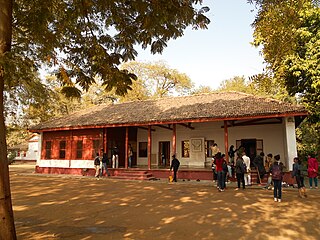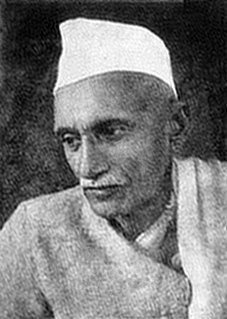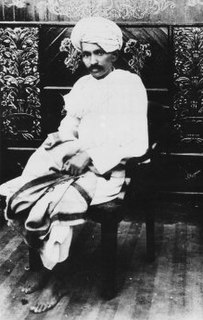Related Research Articles

Sabarmati Ashram is located in the Sabarmati suburb of Ahmedabad, Gujarat, adjoining the Ashram Road, on the banks of the River Sabarmati, 4 miles (6.4 km) from the town hall. This was one of the many residences of Mahatma Gandhi who lived at Sabarmati (Gujarat) and Sevagram when he was not travelling across India or in prison. He lived in Sabarmati or Wardha for a total of twelve years with his wife Kasturba Gandhi and followers, including Vinoba Bhave. The Bhagavad Gita was recited here daily as part of the Ashram schedule.

Swarāj can mean generally self-governance or "self-rule", and was used synonymously with "home-rule" by Maharishi Dayanand Saraswati and later on by Mahatma Gandhi, but the word usually refers to Gandhi's concept of Indian independence from foreign domination. Swaraj lays stress on governance, not by a hierarchical government, but by self-governance through individuals and community building. The focus is on political decentralisation. Since this is against the political and social systems followed by Britain, Gandhi's concept of Swaraj advocated India's discarding British political, economic, bureaucratic, legal, military, and educational institutions. S. Satyamurti, Chittaranjan Das and Motilal Nehru were among a contrasting group of Swarajists who laid the foundation for parliamentary democracy in India.

Gandhism is a body of ideas that describes the inspiration, vision, and the life work of Mahatma Gandhi. It is particularly associated with his contributions to the idea of nonviolent resistance, sometimes also called civil resistance.

Madeleine Slade, also known as Mirabehn or Meera Behn, was a British supporter of the Indian Independence Movement who in the 1920s left her home in England to live and work with Mahatma Gandhi. She devoted her life to human development and the advancement of Gandhi's principles.
Narhari Dwarkadas Parikh was a writer, independence activist and social reformer from Gujarat, India. Influenced by Mahatma Gandhi, he was associated with Gandhian institutes throughout his life. He wrote biographies, edited works by associates and translated some works. His writing also reflected Gandhian influence.

Ravishankar Vyas, better known as Ravishankar Maharaj, was an Indian independence activist, social worker and Gandhian from Gujarat.
Prabhudas Patwari (1909–1985) was an Indian lawyer, community activist, freedom fighter, Gandhian follower and vegetarianism activist.

Usha Mehta was a Gandhian and freedom fighter of India. She is also remembered for organizing the Congress Radio, also called the Secret Congress Radio, an underground radio station, which functioned for few months during the Quit India Movement of 1942. In 1998, the Government of India conferred on her Padma Vibhushan, the second highest civilian award of Republic of India.

The Bardoli Satyagraha, in the state of Gujarat, India during the British Raj, was a major episode of civil disobedience and revolt in the Indian Independence Movement on 12 June 1928. The movement was eventually led by Vallabhbhai Patel, and its success gave rise to Patel becoming one of the main leaders of the independence movement.

The Gujarat University is a public state university located at Ahmedabad, Gujarat, India. The university is an affiliating university at the under-graduate level and a teaching university at the postgraduate level. It is accredited B++ by NAAC. It was established in 1949.
Mahuva is a town and taluka of Bhavnagar District, in the state of Gujarat, India. Located on the coast of the Arabian Sea, Mahuva is known for its mild weather and green, lush surroundings, including many coconut tree plantations. The town is a part of the Saurashtra region and is known as the Kashmir of Saurashtra. Mahuva is also known for wooden toys, raw onions, groundnuts, and a local variety of mango called the Jamadar. The region is home to a thriving agribusiness industry, particularly enterprises that dehydrate vegetables such as garlic and onions for use in processed foods.
The history of Gujarati literature may be traced to 1000 AD, and this literature has flourished since then to the present. It is unique in having almost no patronage from a ruling dynasty, other than its composers.

J. C. Kumarappa was an Indian economist and a close associate of Mahatma Gandhi. A pioneer of rural economic development theories, Kumarappa is credited for developing economic theories based on Gandhism – a school of economic thought he coined "Gandhian economics."

Bhogilal Pandya (1904-1981) was a freedom fighter and social worker from Dungarpur in the Indian state of Rajasthan. On 3 April 1976, the Government of India awarded him the Padma Bhushan for his social services. The Padma Bhushan is the third-highest civilian award in the Republic of India, given for distinguished service to the nation. For his championing of education and rights for the poor and underprivileged, he is referred by the people of Rajasthan as "Gandhi of Vahgad". His home is in the Gandhi aashram area of Dungarpur.
Haku Vajubhai Shah was an Indian painter, Gandhian, cultural anthropologist and author on folk and tribal art and culture. His art belonged to the Baroda Group and his works are considered in the line of artists who brought themes of folk or tribal art to Indian art.
Bishambhar Nath Pande was a freedom fighter, social worker, and parliamentarian in India. Pande devoted his life to the cause of national integration, and to the spread of the Gandhian way of life.
Thakurdas Bang was an Indian Gandhian philosopher and Gandhian economist. He was involved in the Indian independence movement. He practised Gandhism, Gandhian philosophy, Gandhian study even at the age of 95. He was also involved in Khadi and Sarvodaya movements. As an economic professor in G S College of Commerce he motivated many students like Madhukarrao Chaudhari, Justice Chandrashekhar Shankar Dharmadhikari and Ramakrushna Bajaj to participate in the freedom struggle. He is succeeded by Abhay Bang and Ashok Bang. Ashok Bang decided to work for issues related to farming and Abhay decided to work for health of villagers. Abhay and Rani Bang founded SEARCH - a non-profit organization in Gadchiroli, which is involved in rural health service and research
Chunibhai Vaidya, popularly called Chunikaka, was an activist and Gandhian from Gujarat, India.

The Kheda Satyagraha of 1918 was a satyagraha movement in the Kheda district of Gujarat in India organised by Mahatma Gandhi during the period of the British Raj. It was a major revolt in the Indian independence movement. It was the third Satyagraha movement. After the successful Satyagraha conducted at Champaran Bihar in 1916, Gandhi organised the movement to support peasants who were unable to pay the revenue because of famine and plague epidemic.
Khurshedben Naoroji (1894–1966) was an accomplished soprano and an early part of the Indian Independence Movement. She was the grand daughter of India's first nationalist leader and the first Indian to serve in the British Parliament Dadabhai Naoroji.
References
- ↑ "The city that Ahmed built: Which version of Ahmedabad are we prepared to preserve?". The Indian Express. 24 July 2017. Retrieved 30 June 2021.
- ↑ "The Onion Thief | Gandhi Autobiography or The Story of My Experiments with Truth". www.mkgandhi.org. Retrieved 30 June 2021.